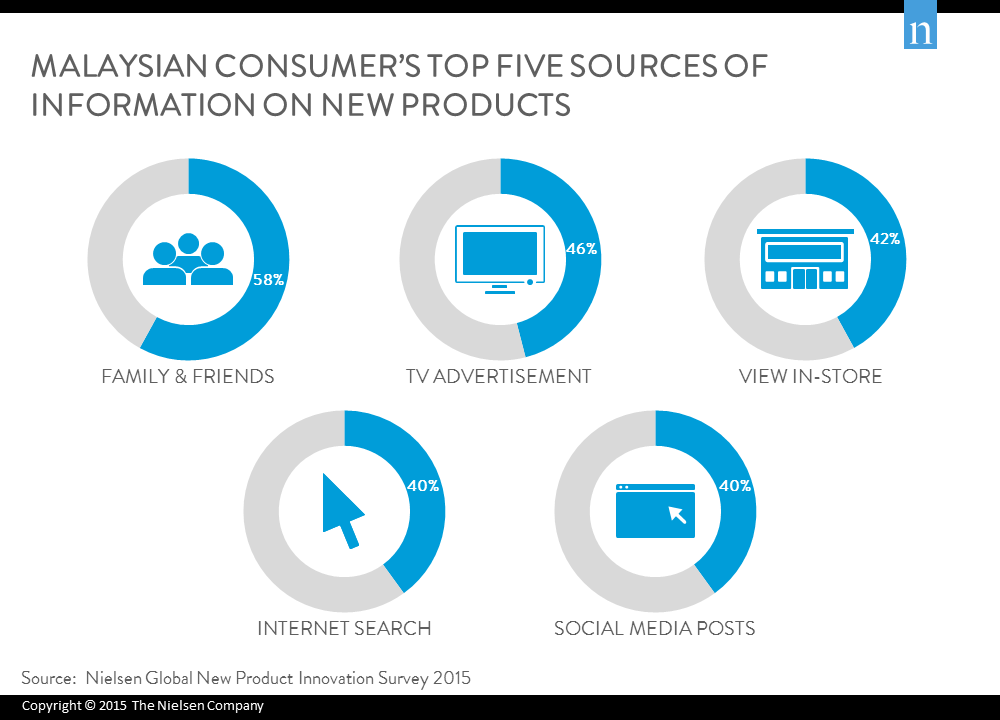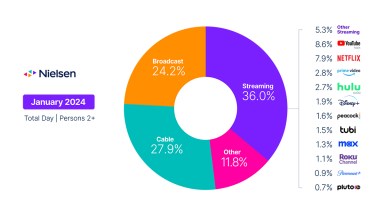Consumers in Southeast Asia show a strong affinity for brands which are investing in new product development and are among the most likely globally to trial new product offerings according to Nielsen’s latest global New Product Innovation Survey.
Consumers across the globe are enthusiastic about new products, but their purchasing patterns vary widely. Close to three quarters of Southeast Asian consumers (73%) said they purchased a new product during their last grocery shopping trip (16% higher than the global average of 57%).
About two thirds of Malaysian consumers prefer to buy new products from brands which are familiar to them (63%) and liked it when manufacturers offer new product options (63%). About a third of Malaysians also say they are an early purchaser of new product innovation (33%).
When it comes to obtaining information on new products, television advertising plays a key role – 10% of Malaysian consumers rank television as their number one source of new product information and 46% rank television advertising in their top five sources. Recommdations from family and friends along with the internet are also key influences of new product trials, with 58% Malaysians ranking family and friends in their top five sources of new product information.

“Consumers throughout Southeast Asia have a strong appetite for innovation and they are increasingly demanding and expecting better choice,” observes Johan Vrancken, Head of Nielsen’s Innovation Practice in Southeast Asia, North Asia and Pacific. “But success can be hard to come by. Brand competition is intense and shelves are crowded so knowing the channels which are most effective in delivering new product information is crucial.”
About a third of Malaysians also quote affordability as the key driver of new product trial (34%) followed by personal recommendation (32%) and family suitability (31%). As for new product demand, Malaysians indicated products which centered on affordability (57%), convenience (37%), health (36%) and natural ingredients (34%) as key focus.
“We know there is increaseing awareness of a focus on health and sustainability across the region and these latest findings certainly highlight that demand,” emphasizes Vrancken. “As consumers become better educated on the importance of making healthy choices, they are increasingly seeking out products which support a healthy lifestyle and are made with fresh, natural ingredients. Similarly, as consumer consciousness increases around the importance of caring for the environment and developing sustainable products, demand for such products is increasing. These are invaluable insights to feed into the new product development process, which help ensure efforts are focused in the areas which will have the greatest resonance with the intended end user.”
Insights contained in this article are based on results from the Nielsen Global New Product Innovation Survey 2015.
关于尼尔森全球调查
The Nielsen Global New Product Innovation Survey was conducted between February 23 and March 13, 2015, and polled consumers in 60 countries throughout Asia-Pacific, Europe, Latin America, the Middle East, Africa and North America who have made a baby care purchase in the past five years. In Malaysia, the sample size is 513. For the purposes of this study, we define a new product as any item a consumer has never purchased in the past. The study uncovers the reasons for making a new product purchase, identifies the types of products consumers want but can’t find and details the sources consumers use to learn about them. The sample has quotas based on age and sex for each country based on its Internet users and is weighted to be representative of Internet consumers. It has a margin of error of ±0.6%. This Nielsen survey is based only on the behavior of respondents with online access. Internet penetration rates vary by country. Nielsen uses a minimum reporting standard of 60% Internet penetration or an online population of 10 million for survey inclusion. The Nielsen Global Survey, which includes the Global Consumer Confidence Index, was established in 2005.




